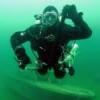
Warm Water Dive Training compare to Cold Water?
#1

Posted 13 May 2005 - 01:21 PM
Well I survived it and I'd like to do more cold water diving but a number of issues occured to me that made me realize I am not fully trained to do cold water dives. And regardless of how many total warm water dives you have...its like starting over and its totally different!
Of course there is the obvious staying warm issue...wet vs. dry....as well as proper gear...not all dive gear is conducive to cold water...and there is a question of training which is what I'm really interested in.
So what are your recommendations on training to learn to be a 'cold water' diver?
Contact me directly at Kamala@SingleDivers.com for your private or group travel needs or 864-557-6079 AND don't miss SD's 2018-2021 Trips! ....here! Most are once in a lifetime opportunities...don't miss the chance to go!!
SD LEGACY/OLD/MANUAL Forms & Documents.... here !
Click here TO PAY for Merchandise, Membership, or Travel
"Imitation is the sincerest flattery." - Gandhi
"Imitation is proof that originality is rare." - ScubaHawk
SingleDivers.com...often imitated...never duplicated!
Kamala Shadduck c/o SingleDivers.com LLC
2234 North Federal Hwy, #1010 Boca Raton, FL 33431
formerly...
710 Dive Buddy Lane; Salem, SC 29676
864-557-6079 tel/celfone/office or tollfree fax 888-480-0906
#2

Posted 13 May 2005 - 01:28 PM
DSSW,
WWW™
#3

Posted 13 May 2005 - 01:38 PM
And Argon is your friend if you can afford it.
#4

Posted 13 May 2005 - 01:43 PM
Be aware that hypothermia is a cumulative function of immersion--you don't recover core body temp immediately after a one hour dive in 50 degree water.
Weighting and general loading effects (I find thick wetsuits or even a dry suit just leave me a lot more tired after a dive from wearing a 7 mil (or a dry suit) compared to a skin or even a 3 ml.) You'll be wearing more weight and that translates to more problems in getting back on the boat if you can't get rid of it. A weight harness is a good idea with a wetsuit if your amount of weight warrants it.
Rehydration is just as important in cold water as it is in hot water. Also, you'll be burning more calories to stay warm. Rehydrate and eat regularly.
I've always felt (and some may disagree) that just being in cold water, feeling it on your face, or any exposed area, was a stress factor and should be considered in whatever task you are planning to do in your assessment of task loading and how it will affect your performance.
When I used to do classes in the lake in 50 degree water, it generally took us a good 15 minutes longer to finish a class of typically 8 students on skills evaluation. We also had more problems with panic and stress in cold water classes than during the summer.
Just my two cents worth.
#5

Posted 13 May 2005 - 01:49 PM
You may need a different set of fins depending on the shoe on the dry suit.
Very good point, especially if you're using something like DUI rock boots.
#6

Posted 13 May 2005 - 01:58 PM
I tried argon for a while but gave it up after finding it didn't keep me any warmer for the type of no-deco and mostly non-repetitive dives that I do. However, some tech diver friends of mine swear by it for tech dives with long deco stops, which I don't doubt.You may need a different set of fins depending on the shoe on the dry suit. Also a full facemask is nice depending on how cold the water is.
And Argon is your friend if you can afford it.
"A good marriage is like an interlocking neurosis, where the rocks in one person's head fill up the holes in the other's."
#7

Posted 13 May 2005 - 02:33 PM
Well, first thing that comes to mind is visit us more often. I don't know that there is any specific training course you can enroll in. One of our former club members hosts dives called "Discover Local Diving", I can put you in touch with him. I think it's more a matter of just getting the experience and used to the gear. Since you're in Dallas, I don't know where you would get the experience locally, other than a cold shower.So what are your recommendations on training to learn to be a 'cold water' diver?
There are courses for using dry suits, but I never bothered when I went from wet to dry, I just spent 5 or 6 miserable dives getting used to it. Obviously there is more load due to the exposure gear being more cumbersome. Since you had use a couple of live (a-hem) "hand warmers", you may want to consider dry gloves. The drawback to dry gloves is they add to the gear stress. There are some things that I do to prepare that apply to all diving, but even more so in cold water:
Make darn sure you are well rested and fed. The cold and gear is going to sap more of your energy, don't skip a meal if the dive happens to come around meal time, eat first. If it's an early morning dive, I usually skip social activities that would keep me up (another reason I didn't go to the HH).
Low visibility. A good strong light is standard even on day dives. Not so much for you to see things with, but also so your buddy can spot you. Many a times when my buddy was only a few feet away and all I could see was their light.
I switched to Nitrox not to increase my bottom time, but to reduce the amount of post-dive fatigue that I get with regular air. My bottom time is still the same because after 45 minutes I start getting too cold anyway.
I don't like to boast, but I don't know of any other cold water dive destinations that are higher rated than the PNW, which includes BC and Puget Sound. So that also means learning to plan dives around slack current. You can go the fancy route and get expensive software. Or the more common method that most folks use is a TideLog
"A good marriage is like an interlocking neurosis, where the rocks in one person's head fill up the holes in the other's."
#8

Posted 13 May 2005 - 02:46 PM
#9

Posted 13 May 2005 - 02:59 PM
For example, I know that next month, when I'm in Florida, I'll probably forget at first and spend much of my first dive looking into the coral reef (not that there isn't much to see there) and see less of what's swimming about in the midwater areas.
Rick
Sometimes the road less traveled is less traveled for a reason.
#10

Posted 13 May 2005 - 10:33 PM
More gear means that you are working harder. No doubts on this point. There will be more weight just because of the increased exposure protection. I know that you dive a BP/W, but for someone who bought a light BC... ask whether the lift of your BC can handle the increased weight. Regs... plan for a regulator to free flow. It will happen sooner or later if you dive in areas like the Pacific NW, NE Atlantic Coast, or (last but not least
Don't neglect to eat or drink. Your distance from DCS or CNS oxygen toxicity tends to be shorter in cold water due to the constriction of blood vessels (one theory, but there are other reasons as well). Take care about not pushing oxygen/PO2 limits and DCS limits/tables/computers in cold water. By that, I mean more care than you would take in warm water. I typically dive lower PO2 mix than I would "down south" to compensate for these issues. (For instance the depths that they dive EAN30 in NC is normally EAN28 to me.) Nitrox is a huge plus. You will be tired enough aways. Why add more microbubbles if you can reduce them by diving Nitrox?
Gas management... obviously you will tend to use more gas in heavier gear than you will in lighter tropical gear. Larger tanks may be required to compensate for this.
I do tend to use wet gloves unless the top-side temps are cold as well. They make it easier to feel my gear. If the rest of my body is warm, my hands and face tend to stay warm underwater as my body isn't sending as much blood to the core to stay warm. Get used to not having that precise feel for your gear clip points because of heavy gloves. You may even consider investing in easier to operate (ie. bigger fingerholds) snaps for your gear.
Still, your core temp will not recover near as fast as it will in the tropics. As I get cold by the end of a three to five day trip to S. Florida or Provo, imagine what this means for insulation and recovery times up here. Doing five dives a day in cold water is even less advisable than it is in warm water for that reason. Reminder: slight hypothermia is a risk factor for the dreaded decompression illness. You may require more time to warm that core temperature back up in cold water.
Visibility... what vis? LOL As Hipshot pointed out, that is a flaw in my diving. I tend to look at the bottom or the object that I am diving on if I am not checking on my buddy (if I have one). I tend to miss looking for things in the middle of the water column as we don't have the vis up here to see it anyways. Also, it is easy for me to be deeper than I would think. Up here, it is quite dark at 100 ft. more often than not. In the tropics, I could be at 150 ft. and see more light than at ninety ft. in the Great Lakes. This can be deceiving. I can't say that I haven't seen some awful vis. in the Turks/Caicos or SE Florida either. It is simply less frequent to have thirty ft. vis in those areas.
That is all that I can think of for now. The others have already done a great job discussing these different styles of diving.
Edited by Diverbrian, 13 May 2005 - 11:20 PM.
#11

Posted 13 May 2005 - 10:48 PM
Yes, if you're breathing He mixes, you will get colder and the Argon will make a difference for sure. For regular recreational dives with normal "no-deco" exposures, the argon may not be so beneficial as to worry about it if you have trouble getting it or arranging the extra equip. Also, in colder water, your air consumption will probably increase, and having a separate inflation bottle for your dry suit may be good even if it is filled with air. In 38 degree water, Argon was definitely my friend!I tried argon for a while but gave it up after finding it didn't keep me any warmer for the type of no-deco and mostly non-repetitive dives that I do. However, some tech diver friends of mine swear by it for tech dives with long deco stops, which I don't doubt.
Good gloves or preferrably 3 finger mittens or dry suit gloves to keep your hands functional...
A custom hood isn't that expensive and the great fit is nice. I had mine made thicker around the skull, but thinner where it came over my neck seal which is neoprene too and the thinner neck made donning easier.
Remember, full face masks can cause CO2 problems...
be carefull of cramps being more prevalent in cold water.
Be careful of weight harnesses becoming obstructed and not being able to ditch your weight... especially when you are unfamiliar with all this new configuration of gear. I had to rescue a guy with such a harness that wasn't ditchable, and I couldn't take his BCD off because he would go straight to the bottom. Of course he was a HUGE guy and diving wet with a harness to hold enough weight to get his large sized body below the surface.... or so he said. I really think he was tremendously overweighted.
Being able to relieve yourself under water in cold is good. That means you will properly hydrate yourself beforehand, minimizing DCI possibilities. Drink lots of fluids starting a couple days before the dives. Avoid alcohol and diuretics <sp?> (incl. caffeine).
Are you still having fun yet??? <g>
Make sure your reg is not prone to freezing in cold environments. A simple freeflow of rushing "cooling" air past the internal components can freeze it open with a massive freeflow. Learn how to stop a freeflow the instant it starts and you may avoid a massive loss of gas. Often, sticking your thumb in the mouthpiece is the fastest way to stop it, otherwise you'll probably have to turn the gas off and submerge the parts to warm them before turning the gas back on. Diaphram regs are more environmentally sealed, and en environmental kit may be warranted depending on how cold the conditions will be.
Well, that is just what I can think of off the top of my head... I'll post more if someone else doesn't come up with them later. I'm getting ready to go diving offshore... seas forecast 2 feet for the next two days... and my boat is aching to get out of the "stable"... <g> Hope this all helped. I'm sure our tech guys in MI can come up with more hints/pointers.
ITB...
Actually, the WORST day of diving is better than the BEST day at work...
and... my life is not measured by the number of breaths I take, but by the number of breaths I take UNDER WATER
"I see you are no stranger to pain." -- "I was married... TWICE!!!" HOT SHOTS, PART DEUX
#12

Posted 13 May 2005 - 10:54 PM
#13

Posted 13 May 2005 - 10:57 PM
Yep, I was thinking of DB when writing my last post. Fortunately, I don't have to dive in cold water ALL the time...It is not quite the same. The posts here have covered most of the differences and the I like to think about the reasons for them. They are more important.
ITB...
Actually, the WORST day of diving is better than the BEST day at work...
and... my life is not measured by the number of breaths I take, but by the number of breaths I take UNDER WATER
"I see you are no stranger to pain." -- "I was married... TWICE!!!" HOT SHOTS, PART DEUX
#14

Posted 13 May 2005 - 11:26 PM
I hate to say but Brinybay is correct about the training issue. There really isn't a way to train for this except possibly taking the drysuit course and EXPERIENCING it! I just recommend that your first dives in any new diving environment be with a local who knows the ropes. Cold water is certainly up there on that list of new environments.
You can read all of the tips in the world, but until you are looking at a wooden schooner better than 100 yrs. old and able to still see the saw marks on the ship you haven't experienced it. That experience will guide you for later dives and show you why we who live near cold water still love to dive in it!
#15

Posted 14 May 2005 - 11:23 AM
One the flip side, the first time I did a warm water dive (84 deg) It took me a while to get over the shock of not being shocked by the water to function properly. It took me a couple of dives to feel comfortable in the warm, clear water.
Every existing thing is born without reason, prolongs itself out of weakness, and dies by chance. - Jean-Paul Sartre
I feel the urge, the urge to submerge! -ScubaHawk - Raptor of the Deep !
WHO DAT!!!!
1 user(s) are reading this topic
0 members, 1 guests, 0 anonymous users


















